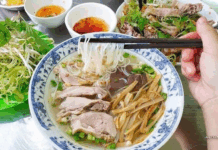Hundreds waited to get on tourist boats to visit the famed karsts of the UNESCO heritage site of Ha Long Bay with few following social distancing norms.
Most removed face masks as they climbed on board and posed for selfies.
“This is my first time to Ha Long after COVID. I came here because there is so much beautiful scenery … and the COVID pandemic is gone so I feel safe,” said Duong Quang Hieu, 21, from the mountainous northern province of Tuyen Quang.
“I’m planning to travel to Danang and other places too.”
Vietnam has won plaudits for its fast and aggressive response to the spread of the coronavirus, which has so far kept infections down to 318 with zero deaths despite its long, porous border with China.
But the swift closure of the country came at a cost. The tourism take plummeted to US$340 million in the first four months of the year, according to government statistics, down 45 per cent year-on-year.
Doors remain closed to foreign travellers, but authorities are turning to the domestic market of millions wearied by long weeks of self-isolation and travel bans to get the tourist economy moving again.
“It’s nice to travel at this time. We have a wide range of hotels to choose from,” said tourist Phan Van Kien from Hanoi.
Kien said his family would travel domestically for the rest of the year with many international flights cancelled and fears still strong over the spread of the virus.
The French-established Dalat city has also been packed with local holidaymakers since early May.
In 2019, Vietnam received more than 18 million foreign travellers, the majority from Asia.
By: AFP/gs



